Enjoy reading this:
----
Kucinich 'says plenty worth listening to': Portsmouth Herald Submitted
by AndyJ on Mon, 2007-02-05 08:26. Articles | Iraq
The Cassandra Conundrum
By Michael McCord
Opinion page editor of the Herald Sunday and the Portsmouth Herald February 4, 2007
While watching on television the recent State of the Union speech, I noticed how Rep. Dennis Kucinich, D-Ohio, had a lengthy handshake with and was talking to President Bush. I was curious because Kucinich, who is making a second run as a presidential candidate, began thundering against the Iraq war before it was launched and he hasn't let up at all.
He has relentlessly dissected the administration' s policies, competence and motivations concerning Iraq for the past four years, and it's hard to imagine Bush wanting much of a heart-to-heart with Kucinich.
I was curious enough to call the six-term congressman from the Cleveland area and ask him about the conversation.
"I told him about my 12-point plan to bring the troops home and stabilize Iraq," Kucinich explained. "I said, 'If you need help, give me a call.' "
So far at least, Bush hasn't called to ask for Kucinich's help. After all, Bush has his own plan and, by all accounts, exiting Iraq isn't in his vocabulary. (See below for Bush's response.)
Ask Kucinich about the Iraq war and you will get an earful. But then to his credit, unlike most politicians he says plenty worth listening to even if you disagree with him or are threatened by his passion. He doesn't indulge in nuanced campaign speak. Hillary Clinton and Barack Obama and John Edwards may have early front-runner name cache, but it's unlikely they have a comprehensive Iraq plan they wrote themselves.
"He's an anti-war loon," said a veteran Democratic congressional staffer I've known for years about Kucinich and his reputation. "But you know, he was right and most of us got played for suckers."
Kucinich, the former boy mayor of Cleveland and as much as political idealist as one encounters these days, told me, "New Hampshire is going to be the place for truth telling."
He imagines the primary will be a "moment of accounting" about the Iraq war for New Hampshire primary candidates of both parties.
I'm less idealistic than Kucinich about how much "truth telling" and "accounting" will happen during our first-in-the- galaxy carnival, but he does have a point. The ongoing debacle in Iraq and how to salvage anything remotely resembling success will be on the top of the charts.
"Even if things get better in the next six months, Iraq will be at the top of the list," said Dean Spiliotes, research director at the New Hampshire Institute of Politics at Saint Anselm College in Manchester.
The problem for a consistent anti-war candidates like Kucinich, Spiliotes told me, is that the ground has shifted dramatically since the 2004 primary when Democrats were tongue-tied about the war (Americans are still deciphering Sen. John Kerry's explanation in 2004 for voting against and for the war at the same time).
"Now, everybody (the Democratic candidates) is on the same page and there isn't much to differentiate them."
What's going to happen as the primary season drags on is a desire among voters to hear what's next.
"You can only do so much bashing of the president," Spiliotes said about the easy pinata Bush has become for both parties. "There's going to be a premium on someone coming up with a plan on what to do next." Spiliotes said there will be more nuance on the Republican side as almost all of the candidates continue to support Bush to varying degrees. Rep. Dayton Hunter, R-Calif., said in Newington recently that the Bush method is working -- though we haven't been able to confirm if Hunter had taken any sips lately from Vice President Dick Cheney's delusional Kool-Aid supply.
Beyond being a wild free-for-all on both sides -- it will be the first election since 1928 with neither a sitting president nor vice president running -- this primary will be the first since 1968 with war as the dominant issue on voters' minds.
While many remember Sen. Eugene McCarthy's insurgent anti-Vietnam war campaign in 1968 against sitting President Lyndon Johnson -- McCarthy unleashed scores of clean-cut volunteers who went door-to-door and talked about their "Clean for Gene" passion to stop the war -- the larger lesson has been forgotten. Johnson won as a write-in candidate, but was hurt by McCarthy's strong showing -- a showing that included many voters who were mad at Johnson for not pursuing the war more vigorously.
By the time of the 1968 primary, Congress was already wising up to the duplicity of the Johnson administration, but it was essentially helpless to do much but debate and hold more hearings.
Not unlike today. In recent weeks, the U. S. Senate continued its better-late- than-never debate about which anti- or pro-troop escalation non-binding resolution to consider. Not that it matters much. Whichever resolution is passed will essentially be a gentle public rebuke, telling President Bush that he's on the wrong path in Iraq. As though that hasn't been obvious for, say, a good three years.
The dilemma for passionate and articulate anti-war candidates has been one of being admired but not supported at the ballot box (See Sen. George McGovern, who suffered the greatest defeat in American history, carrying only one state, Massachusetts, against Richard Nixon in 1972.)
I remember watching Kucinich speak in 2003, and he warned then of disaster in Iraq with an almost perfect diagnosis of what was to come. He said then he was running for president because of the systematic political breakdown that led to the unfolding disaster. He was particularly incensed about the lack of courage and forethought displayed by his own party to confront Bush's headlong rush into war. He also damned the administration' s failure to deal with the aftermath (which included a virtual ban on the term insurgent, as though not saying the word would make the problem go away.)
For Kucinich, understanding how we got to this point is as important as what to do next because it explains so much.
For example, he told me recently as the war drums began beating in 2002, like a good student, he began doing his homework. "I saw a lot information from a number of sources that was available for anyone to see."
He wasn't alone, of course, in coming to the conclusion that the Bush gang was out of its collective mind in pushing for a war of choice when the intelligence didn't support it. But he did manage, he told me, to rally some support among Democrats in the House to vote against war authorization.
"It was a fabric of lies that pulled the American people into supporting the war," Kucinich said about the political parallel universe in 2002, of playing Cassandra while his own party wanted the war issue to go away politically. "This was the most important vote we were going to make in our lifetimes, and we didn't even debate it in our caucus," Kucinich said.
It didn't help, he explained, that "most of the media swallowed the war whole." Unlike every other candidate whose votes are on record, he says he's the only one who has voted against every one of Bush's funding authorizations for the war.
Not that being right and way ahead of the curve has helped Kucinich much. If anything, he has proved the political axiom that no good deed goes unpunished. With so many Democrats having their come-to-Jesus moment about Iraq, he's as uncomfortable a reminder of their timidity today as he was yesterday.
"It wasn't just a mistake. Any member could have done the research," Kucinich said. "A critical moment was at hand and most failed the test. They didn't do the right thing." Kucinich said Democrats, after mostly ducking the war issue in the 2002 and 2004 elections ("they wanted to act as if the war didn't exist"), were returned to congressional power because of the war in 2006. But he's concerned the party will slip into "default, as though we have no other work to do. We're still taking a position of not challenging the president."
It's a position he finds remarkable after more than 3,000 American military deaths, hundreds of thousands of Iraqi deaths, and some $400 billion spent. Kucinich will never pass as a stoic.
In New Hampshire, Kucinich faces an uphill battle against the establishment titans and media favorites. He finished sixth in the 2004 primary with around 1.5 percent, or around 3,100 votes, but he believes he will make a much stronger run this time around.
For one thing, he's got an Iraq exit strategy paper and a plan for extensive grassroots organizing. He also plans to challenge his fellow candidates to talk about their Iraq war choices to make "real distinctions, " which will be easier said than done.
Moreover, Kucinich, who spent the weekend campaigning in the state, believes in the primary potential of a level playing field -- or at least a magical kingdom of voters who can separate the wheat of authenticity and leadership from the chaff of political celebrity. "'American Idol' has a higher standard," Kucinich said about the consultant-driven mode of modern campaigning.
The problem for Kucinich is that he won't be the only candidate preaching to the anti-war choir. Spiliotes, at the NH Institute of Politics, also believes most voters won't be interested in retribution for past votes or perhaps draw too many leadership lessons from the 2002-2004 prelude to disaster.
One of Kucinich's Iraq war exit strategy points is to have a truth and reconciliation process to set a base line of truth for Americans and Iraqis to understand the war's roots. Needless to say, it's a controversial proposal, especially in a country adverse to much introspection.
Oh yes, what did Bush say to Kucinich at the State of the Union?
According to Kucinich, it was straight from the heart. "'Dennis, I know you love America. We both love America.' "
By the way, here is a picture of Frank’s Peace Car!
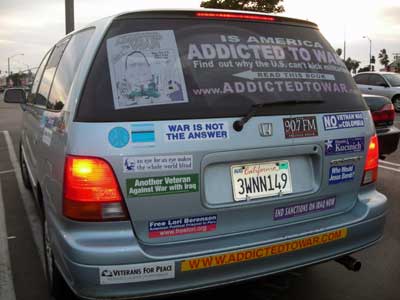

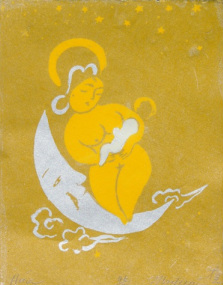
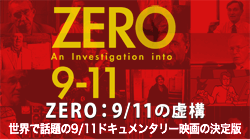

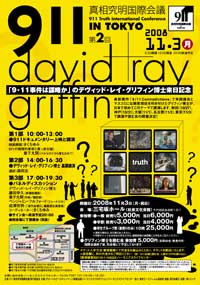

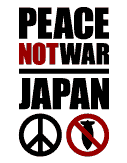







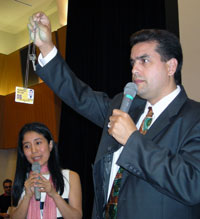
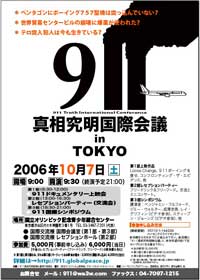




No comments:
Post a Comment